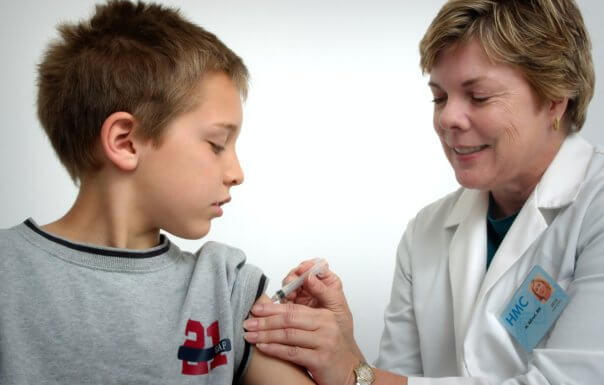Diabetes vaccine shows promise at preserving the body’s insulin production
LINKÖPING, Sweden — As millions of people around the world line up for their coronavirus vaccination, could the next vaccine breakthrough make diabetes a thing of the past? Researchers in Sweden say a clinical study of a potential vaccine for type 1 diabetes has produced encouraging results.
A team from Linköping University finds injecting the protein GAD (or glutamic acid decarboxylase) into a patient’s lymph nodes effectively preserves their ability to produce insulin. In patients with type 1 diabetes, the body’s immune system starts attacking the cells which make insulin. Once all of these cells are destroyed, the body is no longer able to regulate its blood sugar levels.
Unfortunately, just like people with type 2 diabetes who have to monitor their blood sugar constantly, type 1 diabetes patients must take insulin for the rest of their lives. Researchers set out to see if they could slow or possibly completely stop this process.
Training the body to tolerate GAD
Professor Johnny Ludvigsson says one strategy scientists have focused on is altering the way the immune system reacts to encountering GAD. In type 1 diabetes patients, the immune system commonly forms antibodies to attack the protein GAD65. For years, Prof. Ludvigsson has been studying the possibility of making the human body more tolerant of GAD so the immune system stops damaging insulin cells.
“Studies have shown that even an extremely small production of insulin in the body is highly beneficial for patient health.
People with diabetes who produce a certain amount of insulin naturally do not develop low blood sugar levels, hypoglycemia, so easily. They have also a lower risk of developing the life-threatening condition ketoacidosis, which can arise when the insulin level is low,” says Ludvigsson, a senior professor in the Department of Biomedical and Clinical Sciences, in a university release.
In a phase 2 clinical study, called DIAGNODE-2, researchers gathered 109 participants between 12 and 24 years-old who had been diagnosed with type 1 diabetes within the past six months. One group received three monthly injections of a substance called GAD-alum in each patient’s lymph nodes. The other participants received a placebo to serve as a control group.
The team then measured the each person’s natural insulin production at the start of the experiment and 15 months later. They also monitored the group’s long-term blood sugar levels (HbA1c) and how much supplementary insulin patients needed each day.
Having a certain gene is key to the vaccine’s success
Researchers note that genetic factors appear to play a role in how well patients respond to potential diabetes vaccines. With that in mind, the DIAGNODE-2 team looked at several variants called HLA genes. These genes know to look for proteins on the surface of cells and function as “holders” of those proteins. HLA genes then expose certain proteins to immune cells which pass by.
If a protein comes from something harmful like bacteria, immune cells go to work and attack it. Unfortunately, this process also leads to the immune system mistakenly attacking helpful proteins, like insulin producers.
Study authors discovered the HLA gene variant HLA-DR3-DQ2 is responsible for exposing GAD65 proteins to the immune system and triggering type 1 diabetes. Ludvigsson notes that nearly half of the patients in the new study had the HLA-DR3-DQ2 gene variant.
Moreover, although the GAD-alum vaccine did not create a significant difference in insulin production between the treatment and placebo groups, the injections did produce positive results in patients with the HLA gene variant. The shots also do not appear to produce adverse side-effects.
“The patients in the subgroup with the DR3-DQ2 type of HLA genes did not lose insulin production as quickly as the other patients. In contrast, we did not see any significant effect in the patients who did not have this HLA type,” Ludvigsson reports.
“Treatment with GAD-alum seems to be a promising, simple and safe way to preserve insulin production in around half of patients with type 1 diabetes, the ones who have the right type of HLA. This is why we are looking forward to carrying out larger studies, and we hope these will lead to a drug that can change the progress of type 1 diabetes,” the study author concludes.
The study appears in the journal Diabetes Care.
- funkyy and Karlston
-

 2
2



Recommended Comments
There are no comments to display.
Join the conversation
You can post now and register later. If you have an account, sign in now to post with your account.
Note: Your post will require moderator approval before it will be visible.